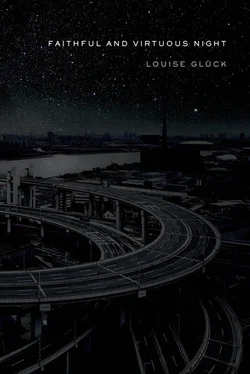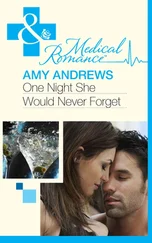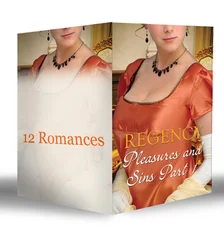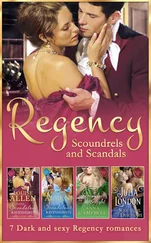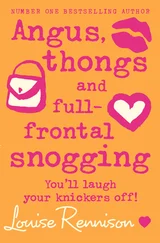essential.
I was on my balcony.
In my right hand I held a glass of Scotch
in which two ice cubes were melting.
Silence had entered me.
It was like the night, and my memories — they were like stars
in that they were fixed, though of course
if one could see as do the astronomers
one would see they are unending fires, like the fires of hell.
I set my glass on the iron railing.
Below, the river sparkled. As I said,
everything glittered — the stars, the bridge lights, the important
illumined buildings that seemed to stop at the river
then resume again, man’s work
interrupted by nature. From time to time I saw
the evening pleasure boats; because the night was warm,
they were still full.
This was the great excursion of my childhood.
The short train ride culminating in a gala tea by the river,
then what my aunt called our promenade,
then the boat itself that cruised back and forth over the dark water—
The coins in my aunt’s hand passed into the hand of the captain.
I was handed my ticket, each time a fresh number.
Then the boat entered the current.
I held my brother’s hand.
We watched the monuments succeeding one another
always in the same order
so that we moved into the future
while experiencing perpetual recurrences.
The boat traveled up the river and then back again.
It moved through time and then
through a reversal of time, though our direction
was forward always, the prow continuously
breaking a path in the water.
It was like a religious ceremony
in which the congregation stood
awaiting, beholding,
and that was the entire point, the beholding.
The city drifted by,
half on the right side, half on the left.
See how beautiful the city is,
my aunt would say to us. Because
it was lit up, I expect. Or perhaps because
someone had said so in the printed booklet.
Afterward we took the last train.
I often slept, even my brother slept.
We were country children, unused to these intensities.
You boys are spent, my aunt said,
as though our whole childhood had about it
an exhausted quality.
Outside the train, the owl was calling.
How tired we were when we reached home.
I went to bed with my socks on.
The night was very dark.
The moon rose.
I saw my aunt’s hand gripping the railing.
In great excitement, clapping and cheering,
the others climbed onto the upper deck
to watch the land disappear into the ocean—
My analyst looked up briefly.
Naturally I couldn’t see him
but I had learned, in our years together,
to intuit these movements. As usual,
he refused to acknowledge
whether or not I was right. My ingenuity versus
his evasiveness: our little game.
At such moments, I felt the analysis
was flourishing: it seemed to bring out in me
a sly vivaciousness I was
inclined to repress. My analyst’s
indifference to my performances
was now immensely soothing. An intimacy
had grown up between us
like a forest around a castle.
The blinds were closed. Vacillating
bars of light advanced across the carpeting.
Through a small strip above the windowsill,
I saw the outside world.
All this time I had the giddy sensation
of floating above my life. Far away
that life occurred. But was it
still occurring: that was the question.
Late summer: the light was fading.
Escaped shreds flickered over the potted plants.
The analysis was in its seventh year.
I had begun to draw again—
modest little sketches, occasional
three-dimensional constructs
modeled on functional objects—
And yet, the analysis required
much of my time. From what
was this time deducted: that
was also the question.
I lay, watching the window,
long intervals of silence alternating
with somewhat listless ruminations
and rhetorical questions—
My analyst, I felt, was watching me.
So, in my imagination, a mother stares at her sleeping child,
forgiveness preceding understanding.
Or, more likely, so my brother must have gazed at me—
perhaps the silence between us prefigured
this silence, in which everything that remained unspoken
was somehow shared. It seemed a mystery.
Then the hour was over.
I descended as I had ascended;
the doorman opened the door.
The mild weather of the day had held.
Above the shops, striped awnings had unfurled
protecting the fruit.
Restaurants, shops, kiosks
with late newspapers and cigarettes.
The insides grew brighter
as the outside grew darker.
Perhaps the drugs were working?
At some point, the streetlights came on.
I felt, suddenly, a sense of cameras beginning to turn;
I was aware of movement around me, my fellow beings
driven by a mindless fetish for action—
How deeply I resisted this!
It seemed to me shallow and false, or perhaps
partial and false—
Whereas truth — well, truth as I saw it
was expressed as stillness.
I walked awhile, staring into the windows of the galleries—
my friends had become famous.
I could hear the river in the background,
from which came the smell of oblivion
interlaced with potted herbs from the restaurants—
I had arranged to join an old acquaintance for dinner.
There he was at our accustomed table;
the wine was poured; he was engaged with the waiter,
discussing the lamb.
As usual, a small argument erupted over dinner, ostensibly
concerning aesthetics. It was allowed to pass.
Outside, the bridge glittered.
Cars rushed back and forth, the river
glittered back, imitating the bridge. Nature
reflecting art: something to that effect.
My friend found the image potent.
He was a writer. His many novels, at the time,
were much praised. One was much like another.
And yet his complacency disguised suffering
as perhaps my suffering disguised complacency.
We had known each other many years.
Once again, I had accused him of laziness.
Once again, he flung the word back—
He raised his glass and turned it upside-down.
This is your purity, he said,
this is your perfectionism—
The glass was empty; it left no mark on the tablecloth.
The wine had gone to my head.
I walked home slowly, brooding, a little drunk.
The wine had gone to my head, or was it
the night itself, the sweetness at the end of summer?
It is the critics, he said,
the critics have the ideas. We artists
(he included me) — we artists
are just children at our games.
After the orchestra had been playing for some time, and had passed the andante, the scherzo, the poco adagio, and the first flautist had put his head on the stand because he would not be needed until tomorrow, there came a passage that was called the forbidden music because it could not, the composer specified, be played. And still it must exist and be passed over, an interval at the discretion of the conductor. But tonight, the conductor decides, it must be played — he has a hunger to make his name. The flautist wakes with a start. Something has happened to his ears, something he has never felt before. His sleep is over. Where am I now, he thinks. And then he repeated it, like an old man lying on the floor instead of in his bed. Where am I now?
An elderly writer had formed the habit of writing the words THE END on a piece of paper before he began his stories, after which he would gather a stack of pages, typically thin in winter when the daylight was brief, and comparatively dense in summer when his thought became again loose and associative, expansive like the thought of a young man. Regardless of their number, he would place these blank pages over the last, thus obscuring it. Only then would the story come to him, chaste and refined in winter, more free in summer. By these means he had become an acknowledged master.
Читать дальше
